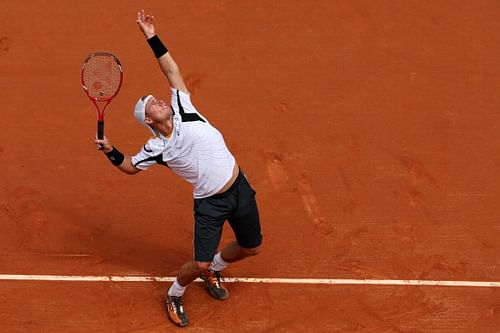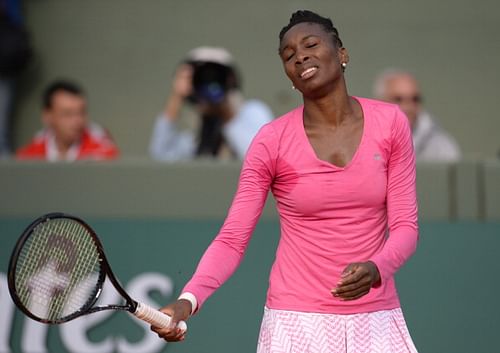
Venus Williams and Lleyton Hewitt hope the grass is greener on the other side
While Roger Federer and Serena Williams were strolling through their first round matches on Court Phillippe Chatrier on Sunday, two players, once regarded as their rivals, were engaged in titanic battles on Court Suzanne Lenglen. 32-year-olds Lleyton Hewitt and Venus Williams both fought bravely from severe holes in the final sets of their first round matches in Paris but both came up short at the finishing line. Now, both are hoping that they will find success when the tennis circuit moves to London for the grass court season.
These days, every time Lleyton Hewitt and Venus Williams take to the court, it seems like they are fighting two opponents – one, the player across the net and two, their frail oft-injured bodies. While both still have the heart and the determination of a champion, their physical struggles have meant that they are unable to play the tennis that made them champions in the first place. Yet, they continue to soldier on – trying to make their minds overcome the physical handicaps that are now a part of their lives.

On Sunday, Hewitt started strong and played what Darren Cahill said was “the best tennis he has seen Hewitt play in about eight years” as he built a two sets to love lead over 15th seeded Gilles Simon. But the Frenchman won the third and fourth sets and went up 5-0 lead in the fifth. Refusing to give up, the Australian battled back to 5-5 even as he needed treatment for blisters on his foot – a sign of the limited schedule he has played this year. But Hewitt came up short right at the end. Simon managed to win the next two games and complete the 3-6, 1-6, 6-4, 6-1, 7-5 win in just over three hours.
Over the years, Hewitt’s body has taken many blows. Take a look at some of his ailments since 2005. Surgery on his left big toe and right big toe in 2005 followed by a broken rib; a right knee injury and a back injury in 2006-07; surgery on his left hip in 2008 and his right hip in 2010 followed by a right hand injury. And left foot surgery in 2011 followed by left toe surgery in 2012. Each injury and surgery taking him off the circuit for a few months and requiring a few more to regain match-fitness and confidence.
Yet Hewitt, who was last ranked in the top 10 in June 2006 and in the top 20 in February 2010, has refused to call it quits. The Australian has his sights sets on Wimbledon, where he has reached the second week nine times during the 2001-2010 decade.
Speaking after his loss on Monday, Hewitt said, “I would have liked to have been on the other end of it. It’s disappointing but I didn’t come here with massive expectations and he’s a quality player as well. You fight for five sets to get the win and the draw opens up a little bit as well and you take a seed’s spot. That’s frustrating for any athlete or competitor. You want to be out there and get the win.”
Hewitt has won two Grand Slams in his career – Wimbledon in 2002 and the US Open in 2001. And both those times that Hewitt lifted the men’s trophy at these slams, the women’s trophy was hoisted by Venus Williams.
Venus has had her own share of problems since climbing back to world no. 2 in May 2010. A knee injury during Wimbledon limited her to playing only the US Open for the rest of that season. In 2011, she played only four events – pulling out of the Australian Open in the third round due to a hip muscle injury, losing in the fourth round at Wimbledon and withdrawing from the second round of the US Open, where she announced that she had been diagnosed with Sjorgen’s Syndrome, an autoimmune disease in which immune cells attack and destroy the exocrine glands that produce tears and saliva.
With millions in the bank and varied business interests outside the tennis world, Venus could have easily walked away from the game too. But instead, she chose to make all the sacrifices in order to give herself the chance to continue playing professional tennis, knowing fully well that even if she did everything her doctors recommended, she could still wake up any morning and feel not fit enough to practice, let alone compete at the highest level.
Venus played a limited schedule in 2012 – just 10 events – but managed to end the year with a respectable 24-9 record. 2013 has been another stop and start season. After reaching the semis in Florianopolis and Charleston, a back injury meant she played only one match on red clay – a first round loss to Laura Robson in Rome.

That lack of match fitness worked against her on Sunday as she took on Poland’s Urszula Radwanska. After splitting the first two sets in tie breaks, Radwanska set up a 5-1 lead in the decider. But Venus, watched by sister Serena and mother Oracene, refused to go away without a fight. She fought back to 4-5 but a few crucial errors in the tenth game handed over the match to Radwanska in three hours and 19 minutes. The fact that Venus could play that long in itself was a victory for the 32-year-old, who also has her sight set on Wimbledon now.
Speaking after her loss on Sunday, Venus commented, “My preparation was extremely unideal. I’ve definitely been struggling. But I just wanted to come here and try to go out there and play. I think my movement is awesome, but I just haven’t played any matches and just haven’t hit any serves, and it’s hard to be perfect in the first match back. But I think there were periods where I found some rhythm, and some where I didn’t. I can’t really serve very hard, but I’m getting better. I just ran out of time to get better for this tournament. I want my serve back – I’m going to try to get it back for Wimbledon.”
“It’s obviously disappointing to lose – it’s not what anyone is going for out here. But I’m strong and I’m a fighter. What I’ve gone through is not easy. And I don’t think I’m just playing for me now, I think I’m playing for a lot of people who haven’t felt well. So for me today it’s a big positive to be able to play for three hours. And I’m constantly finding ways to get better and feel better out there on the court.”
Venus has also had her best successes at Wimbledon – reaching the second week eight years during that 2001-2010 decade, a stretch that yielded five titles and 3 runner-up finishes at SW 19. And like Hewitt, she is hoping that a change in surface will bring about a change in fortunes.
For their fans, watching Hewitt and Williams lose early in the major events maybe painful. But the two of them are not fighting for victory on the court. They’re both fighting a bigger battle – one whose success is not determined by a win or a loss.